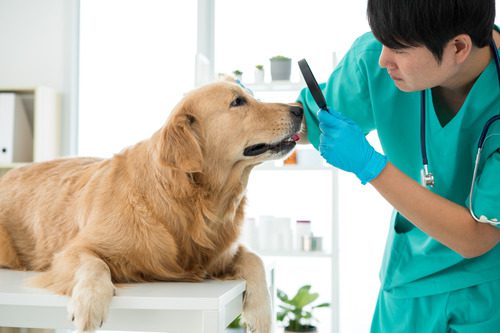My Dog’s Eye is Swollen: Should I Be Concerned?
Seeing your dog’s eye swollen can be alarming. Your furry companion relies on their eyes to navigate the world, and when something seems off, it’s natural to be concerned. Swelling around the eye can indicate a minor irritation or something more serious that requires immediate veterinary attention. In this blog, we’ll help you understand the possible causes behind your dog’s eye swelling and when you should seek veterinary care to ensure your pet’s comfort and health. If your dog’s eye is swollen, call Keystone Animal Hospital in Bradenton, FL, at (941) 741-8445 to schedule an evaluation.

Why Is My Dog’s Eye Swollen?
A swollen eye in dogs can result from various conditions, ranging from minor irritations to serious medical issues.
Allergic Reactions
Dogs, like humans, can experience allergic reactions that cause swelling around the eyes. Allergies can stem from pollen, dust, mold, insect bites, or even certain foods. If your dog’s eye is swollen and they are also sneezing, scratching, or experiencing redness, an allergy could be the culprit. While mild cases might resolve on their own, severe reactions can lead to breathing difficulties or further swelling, requiring urgent veterinary care.
Eye Infections
Bacterial or viral infections can cause inflammation and swelling in one or both eyes. Common symptoms include redness, discharge, excessive blinking, and sensitivity to light. Conjunctivitis, also known as pink eye, is a frequent cause of eye swelling in dogs. If an infection is left untreated, it can worsen and potentially harm your dog’s vision.
Eye Injuries
Dogs are naturally curious and playful, making eye injuries common. A scratch from another animal, an encounter with a thorn, or even rough play can lead to eye swelling. Injuries may also result in corneal ulcers, which are painful and require veterinary treatment to heal properly. If your dog’s eye is swollen due to an injury, prompt evaluation is crucial to prevent complications.
Foreign Objects
A speck of dirt, grass seed, or small debris can get lodged in your dog’s eye, leading to irritation and swelling. Dogs with swollen eyes may paw at their face or blink excessively. If you suspect a foreign object is causing the issue, avoid attempting to remove it yourself, as this can lead to further damage. Instead, contact your veterinarian for professional assistance.
Glaucoma
Glaucoma is a serious condition characterized by increased pressure within the eye. It can lead to eye swelling, redness, cloudiness, and vision loss if untreated. This condition requires immediate veterinary intervention, as untreated glaucoma can result in permanent blindness. If your dog’s eye is swollen and appears cloudy or bulging, contact Keystone Animal Hospital right away.
Abscesses or Facial Swelling
Infections beneath the skin, such as abscesses from bites or dental issues, can cause noticeable swelling around the eye. If an abscess is the cause, you may also notice pus, warmth, or tenderness in the affected area. Dental infections can spread to the eye area, making professional veterinary care essential.
Symptoms That Require Immediate Veterinary Care
While some cases of mild eye swelling may resolve on their own, others require urgent veterinary attention. Watch for these symptoms and contact your veterinarian if they occur:
- Persistent or worsening swelling
- Redness or excessive tearing
- Yellow or green discharge
- Pawing at the eye or rubbing against objects
- Squinting or reluctance to open the eye
- Cloudiness or a change in eye color
- Loss of vision or difficulty navigating
If your dog is experiencing any of these symptoms, call Keystone Animal Hospital at (941) 741-8445 for an evaluation.
Diagnosing and Treating a Swollen Eye in Dogs
Your veterinarian at Keystone Animal Hospital may use various diagnostic methods to determine the cause of eye swelling and develop an appropriate treatment plan.
Physical Examination
Your veterinarian will conduct a thorough examination of your dog’s eye, checking for visible injuries, inflammation, or abnormalities. They may also ask about your pet’s recent activities, symptoms, and medical history.
Diagnostic Tests
If the cause of swelling isn’t immediately apparent, your veterinarian may recommend additional tests, such as:
- Fluorescein Staining: A special dye is used to detect corneal ulcers or scratches.
- Ophthalmic Pressure Testing: Measures intraocular pressure to diagnose glaucoma.
- Bacterial Cultures or Swabs: Identifies infections that may be causing swelling.
- Blood Tests: Checks for underlying systemic issues that could contribute to eye inflammation.
Our Treatment Approach
The treatment plan depends on the cause of the swelling. Common treatments include:
- Antibiotic or Antiviral Medications: If an infection is present.
- Anti-inflammatory or Allergy Medications: To reduce swelling and discomfort.
- Surgical Intervention: For severe injuries, foreign objects, or advanced glaucoma.
- Eye Drops or Ointments: To soothe irritation and promote healing.
Helping Your Dog Recover and Preventing Future Issues
After treatment, monitor your dog’s recovery and take appropriate steps to prevent future eye problems. Follow these tips:
- Administer all prescribed medications as directed by your veterinarian.
- Prevent your dog from rubbing or scratching their eye by using an Elizabethan collar.
- Keep their environment clean to minimize exposure to allergens and debris.
- Schedule regular veterinary check-ups to catch potential issues early.
- If your dog enjoys outdoor activities, be mindful of rough play or potential hazards that could lead to eye injuries.
If your dog’s eye is swollen and you’re unsure what to do, the best course of action is to contact Keystone Animal Hospital in Bradenton, FL, at (941) 741-8445. A timely veterinary visit can make all the difference in protecting your pet’s vision and overall well-being.
